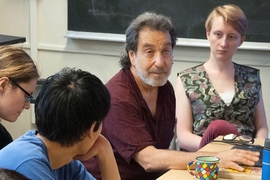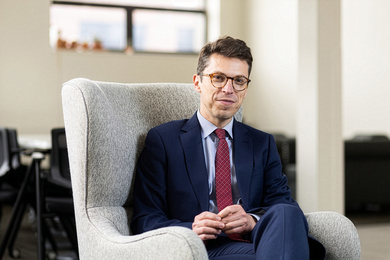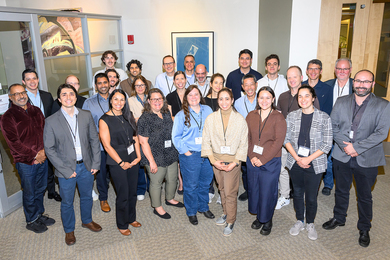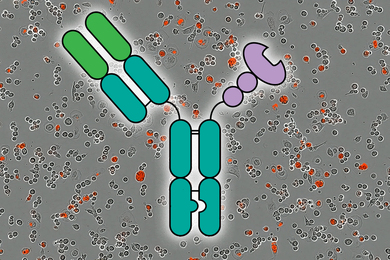A short documentary featuring MIT’s prison education program received an Emmy Award from the New England Chapter of the National Academy of Television Arts and Sciences at its virtual award ceremony on June 20. Produced by WGBH, the film bested five other nominees in the Education/Schools category.
“Redemption: MIT’s Prison Education Program” is an intimate portrait of a class discussion that took place last November, part of philosophy course ES.9114 (Nonviolence as a Way of Life). Taught by Lee Perlman, lecturer and co-director of The Educational Justice Institute at MIT (TEJI), the course enrollment included a small cohort of what Perlman calls “outside” students — 10 MIT undergraduates — and an equal number of “inside” students: youthful offenders at Boston’s South Bay House of Correction. On this particular autumn day, students gathered at the prison to discuss the topic of forgiveness.
“The documentary beautifully captures the humanity of the incarcerated students, and the wonderful human connections between MIT students and the incarcerated people — mostly around their age —who are working hard to turn their lives around,” says Perlman. “At one point in the film, an older incarcerated man lovingly gives advice to a young MIT student about some problems in his family. It shows how coming together on an equal footing allows people from very different backgrounds to learn from each other.”
“The film does a wonderful job illustrating the power of education to serve as a point of communication and understanding, and a degree of equality between students on either side of the wall,” adds Carole Cafferty, co-director of TEJI. “Co-learning models like this speak to our shared humanity and limitless capacity for change, even in the face of challenging circumstances.”
Although the documentary focuses on one particular discussion, “these are real academic classes with college credit, and the incarcerated students also do readings and papers,” notes Perlman.
The course is just one example of TEJI’s programs, which aim to provide unique co-learning opportunities for students inside and outside of correctional facilities. Since its inception in 2017, the initiative has grown by leaps and bounds: in 2018, TEJI established the Massachusetts Prison Education Consortium, comprised of 50 colleges, universities, and other organizations invested in reducing barriers to post-secondary education for those in the criminal justice system.
Research indicates that these efforts can have a dramatic impact: according to a 2013 RAND Corporation study, inmates who experienced post-secondary education are 43 percent less likely to return to prison.
WGBH producers Meghan Smith and Greg Shea approached TEJI in fall 2019 about the project. Inspired by the Ken Burns documentary “College Behind Bars,” they wanted to highlight a local postsecondary education program for incarcerated students.
“When I discovered that Lee not only teaches inside a Boston prison, but he also brings MIT students with him, I knew that would be a fascinating story to tell,” Smith says. “I was also drawn to the fact that Lee teaches subjects like nonviolence and forgiveness. From both student groups, I knew that hearing discussions like that would be interesting — for the ‘outside’ MIT students, since they are the brightest scientific minds I guessed those topics would be novel, and also the ‘inside’ students, who bring a very different perspective to those conversations, since they have such different life experiences.”
Smith found the project moving and inspiring — particularly how honest and open the incarcerated students were about their experiences, “even while we had cameras in their faces,” she says. “Also, I think this program is an example of how powerful institutions like MIT can use their resources to serve social justice causes.”
Perlman and Cafferty are deeply grateful to Smith, Shea, and WGBH for shining a spotlight on the program and hope the film will draw attention to the transformational power of prison education reform.
“This award provides further validation that this story, and successful rehabilitation and re-entry efforts, are not limited to an isolated community but rather are vital issues that society at large should be aware of and invested in,” says Cafferty.
“We are ushering in a statewide renaissance of college in prison, and the documentary will be a great boost to our efforts,” adds Perlman.












